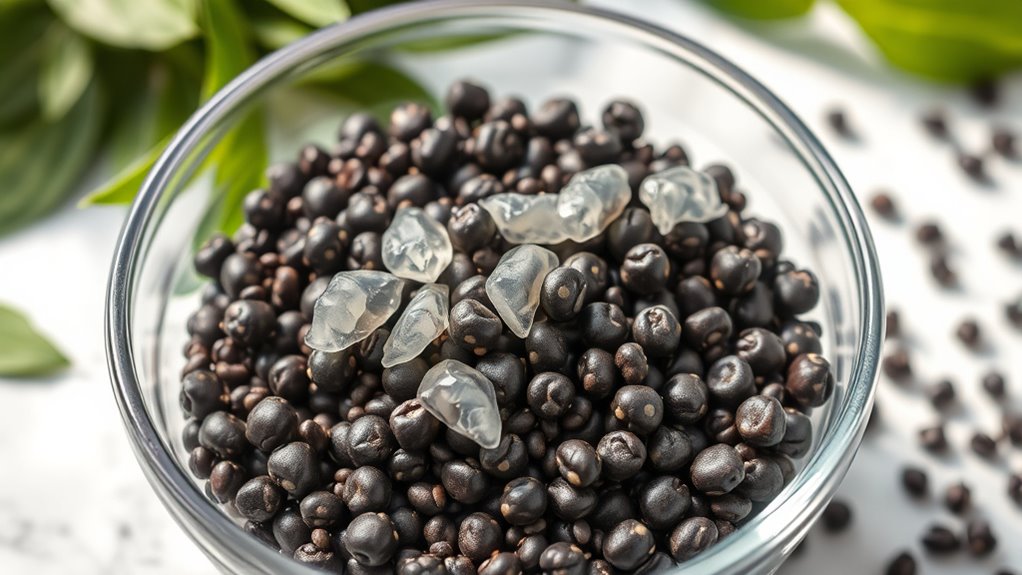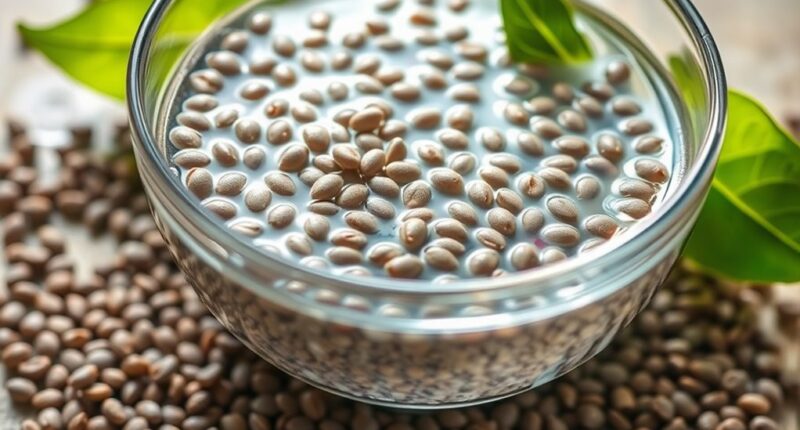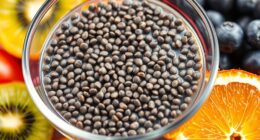Chia seeds can support bowel regularity thanks to their high fiber content, which helps bulk up stool and promotes gentle, sustained digestion. They act as prebiotics, nourishing beneficial gut bacteria and fostering a healthy microbiome, possibly improving overall digestion and reducing bloating. To see benefits, start with small amounts and soak them before eating, ensuring proper hydration. To learn more about how chia seeds can truly help your gut, explore the details ahead.
Key Takeaways
- Chia seeds are a high-fiber food that can promote regular bowel movements when properly prepared.
- They act as prebiotics, supporting beneficial gut bacteria and overall digestive health.
- Proper soaking and hydration are essential to prevent choking and maximize their bowel-regulating benefits.
- Increased fiber intake from chia may cause bloating or gas initially; gradual increase helps mitigate this.
- Scientific evidence supports chia seeds’ role in improving bowel regularity as part of a balanced diet.

If you’re looking for a natural way to improve your digestion, chia seeds might be just what you need. These tiny seeds are packed with fiber, making them an excellent option for fiber supplementation. When you add chia to your diet, you’re giving your gut the fuel it needs to function smoothly. The high fiber content helps bulk up your stool, making bowel movements easier and more regular. Unlike some laxatives that can cause dependency or irritation, chia seeds promote a gentle, sustained improvement in bowel regularity.
Beyond their fiber content, chia seeds also influence your gut microbiome—the diverse community of bacteria living in your intestines. A healthy microbiome is vital for digestion, nutrient absorption, and immune function. When you consume chia seeds regularly, the soluble fiber forms a gel-like substance in your gut, which can serve as food for beneficial bacteria. Over time, this helps foster a balanced microbiome, which in turn supports consistent bowel movements and reduces issues like bloating or constipation.
Chia seeds promote a healthy microbiome and support digestive balance through their prebiotic fiber.
It’s worth noting that the benefits of chia seeds are not just about adding bulk; they also involve the complex interaction with your gut flora. The prebiotic qualities of chia’s fiber encourage the growth of good bacteria, leading to a healthier gut environment. This can help improve your overall digestion, reducing discomfort and promoting regularity. Since every person’s gut microbiome is unique, the effects might vary, but many people notice positive changes after incorporating chia seeds into their routine.
Additionally, ensuring proper storage and preparation of chia seeds can influence their effectiveness and safety. However, it’s important to use chia seeds properly to maximize their benefits. Start with small amounts, like a tablespoon per day, and gradually increase to avoid potential bloating or gas. Soaking the seeds in water or other liquids before eating helps prevent choking and improves digestibility. Remember, drinking plenty of water when consuming high-fiber foods like chia is essential because fiber needs fluid to work effectively. Without enough hydration, you might experience the opposite effect—constipation or discomfort.
Frequently Asked Questions
Are There Any Risks Associated With Eating Too Many Chia Seeds?
Eating too many chia seeds can pose risks like chia seed overdose, leading to digestive issues such as bloating or constipation. Be aware of chia seed allergies, which might cause allergic reactions. Consuming excessive amounts without enough water can also cause choking or blockages. Moderation is key; if you experience symptoms, cut back and consult a healthcare professional to avoid potential health problems.
How Do Chia Seeds Compare to Other Fiber Sources?
You might think all fiber sources are the same, but chia seeds stand out for their fiber diversity and nutrient density. Unlike many other options, they provide soluble and insoluble fiber, supporting digestion and overall health. This combination makes them a powerful addition to your diet. Compared to other fiber sources, chia seeds deliver more nutrients per serving, making them a smart choice for boosting fiber intake efficiently.
Can Chia Seeds Help With Chronic Constipation?
You might wonder if chia seeds can help with chronic constipation. They contain soluble fiber that absorbs water and forms a gel, easing bowel movements. Chia seeds also support your gut microbiome by feeding beneficial bacteria, which can improve overall gut health. While they can be effective for some, individual responses vary, so combining chia seeds with other fiber sources and staying hydrated may give you the best results.
What Is the Ideal Daily Intake of Chia Seeds for Bowel Health?
You might wonder what the ideal daily intake of chia seeds is for bowel health, but there’s no one-size-fits-all answer. Usually, 1 to 2 tablespoons daily can support nutrient absorption and weight management by adding fiber and healthy fats to your diet. Start with this amount, and listen to your body’s signals. Consistent, moderate intake helps maintain digestive health without overdoing it.
Do Chia Seeds Cause Any Digestive Side Effects?
You might wonder if chia seeds cause digestive discomfort. While some people experience bloating or gas initially, these effects usually decrease as your body adjusts. To prevent bloating, start with small amounts and drink plenty of water. Chia seeds are generally safe, but overdoing it can lead to digestive discomfort. Listen to your body and increase intake gradually to enjoy their benefits without unwanted side effects.
Conclusion
Remember, while chia seeds can support your digestive health, they’re not magic. Incorporate them into a balanced diet, stay hydrated, and give your body time to adjust. As the saying goes, “Rome wasn’t built in a day,” so patience is key. Don’t rely on hype—trust the science, and you’ll see steady progress. Keep your expectations realistic and your habits healthy, and you’ll be on your way to better digestion.









